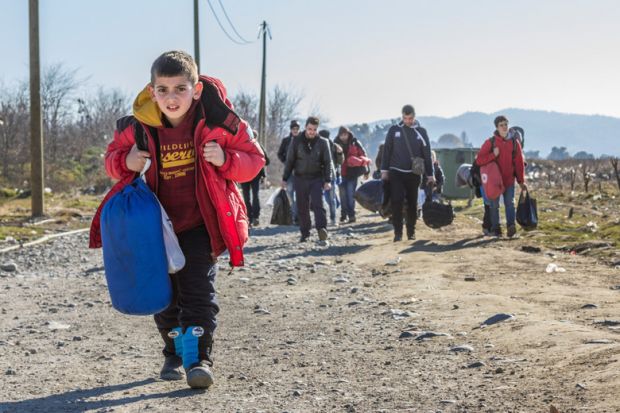Not since the Second World War has the world faced a greater refugee crisis. According to the United Nations High Commissioner for Refugees, the number of refugees exceeds 65 million worldwide, and almost 5 million of those refugees are from Syria.
They have fled the violence in their home country, seeking safety in Jordan, Lebanon, Turkey and other countries. More than 6 million people inside Syria are internally displaced, and another 13 million Syrians are in need of humanitarian aid. Aid organisations are undertaking enormous efforts to meet the basic requirements, including food, shelter and medical care.
While more aid and support are desperately needed to address this humanitarian crisis, it is time to expand the very definition of that support. If you ask young displaced Syrians about their dreams and priorities, their answer points to one of the most underfunded components of humanitarian aid: education.
Education provides hope and a pathway to a self-determined and independent future. Children and young adults from conflict areas around the world dream about being in a classroom to further their education.
Syria, once known for one of the most robust higher education systems in the region, took pride in its pre-war university enrolment of almost 30 per cent. Today, more than 200,000 Syrians outside their home country don’t have access to higher education, while many institutions in Syria have shut down or are only partially functioning. We are in danger of losing an entire generation of Syrian students desperately needed to one day rebuild their country.
Iyad Shami, a Syrian university student in Turkey, says: “Since the beginning of the Syrian crisis, many people missed the opportunity to have an education, and one of the strategic ways to overcome this crisis is through education. Higher education aids in recovering and building a new Syria with educated people of various point of views.”
Higher education has been shown to help reduce poverty and create safer societies. It plays a crucial role in rebuilding countries after times of conflict. An increasing number of universities and organisations worldwide recognise their responsibility to support displaced Syrian students by offering financial and educational assistance through scholarships.
Sometimes, however, finding those scholarships can be difficult and overwhelming. Students often hear of university scholarships through word of mouth or social media. Some scholarship opportunities, such as the IIE Scholarship for Syrian Students, receive thousands of applications for a limited number of scholarships available. Meanwhile, smaller initiatives or opportunities can go unnoticed because they are not well publicised.
Gordon Brown, the former UK prime minister and now UN special envoy for global education, believes that every student deserves the right to continue their education. At the impetus of Brown, and with seed funding from the Catalyst Foundation for Universal Education, the Institute of International Education has developed the Platform for Education in Emergencies Response (PEER). This platform strives to address the information gap and to help connect displaced Syrian students to an education pathway that will help them to realise their academic goals.
PEER is an online clearing house that aims to catalogue higher education opportunities for Syrians, featuring hundreds of scholarships, online and language learning opportunities. It will feature an easily searchable, mobile-ready database enabling Syrians students with limited technical equipment and internet access to browse through the website and identify opportunities available to them.
While the global political climate poses increasing challenges for students from Syria and other countries to resume their studies in traditional safe haven countries, PEER highlights the relentless work of higher education communities on both sides of the Atlantic to support students affected by crises. We hope that the platform will expand the definition of the support students desire and our world desperately needs.
It is a sign of our commitment to the future of Syria’s students and the power of education. Hundreds of thousands of Syrian students are prevented from their right of a higher education, one that can transform their lives.
Nele Feldmann is senior programme officer, and Katherine Miller is global education in emergencies coordinator, both at PEER, Institute of International Education.
PEER, which launched earlier this month, will be discussed at Universities UK International’s International Higher Education Forum on 21 March.
Register to continue
Why register?
- Registration is free and only takes a moment
- Once registered, you can read 3 articles a month
- Sign up for our newsletter
Subscribe
Or subscribe for unlimited access to:
- Unlimited access to news, views, insights & reviews
- Digital editions
- Digital access to THE’s university and college rankings analysis
Already registered or a current subscriber?







